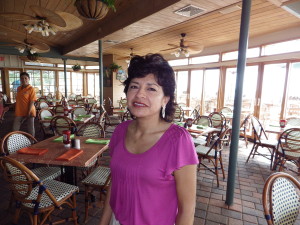Private entities on public land a focus in Rye
Seaside Johnnie”™s restaurant offers a public benefit and should be taken back off the tax rolls, a judge has ruled.
The seasonal restaurant sits on a scenic slice of Rye Town Park, overlooking Oakland Beach and the Long Island Sound. Although it is privately owned, it rests on public land and should be reinstated as a tax exempt parcel, according to a 25-page state Supreme Court ruling from Judge Bruce Tolbert.
Rye Town Park is operated jointly by the town of Rye and city of Rye, two separate municipalities sharing the same name. The ruling means the city will have to pay the town roughly $27,000 in refunded property taxes and interest. Seaside”™s lease states that the owners of the property, not the lessee, are responsible for any taxes levied. Ironically, if the city assessor”™s ruling had held, the city, as a joint operator of the park, would effectively have taxed itself.

Paul Noto, attorney for the town, disagreed with the city”™s stance that the restaurant should be taxed the same as any eateries on Purchase Street, in the heart of the city”™s downtown. A park commission made up of town and city elected officials has oversight of operation of the restaurant through writing its lease and from approving the prices the facility charges for food and beverages. “The City Council doesn”™t get involved in menus, uniforms and pricing for the restaurants on Purchase Street,” Noto said.
A snack bar or sand bar has operated tax-exempt on that property since 1907. Seaside Johnnie”™s opened in 2000 and quickly became a popular destination restaurant during the summer months. With the new business model, city officials said, came morevisitors and traffic as well as an increased need for police, fire and sanitation services. The restaurant pays just under $100,000 a year, with its current lease set to expire 2016.
The Supreme Court decision is sure to have ramifications in a growing debate about public property along the Sound Shore and the private partnerships that have sprung up in the last decade. Though being located on public land in itself is not enough to justify a tax exemption, there is case law in the favor of private ownership when the private enterprises are viewed as a benefit and don”™t impede access to public land. Ralph Wilson Stadium, where the Buffalo Bills play, is a widely-publicized example of a public property leased to a private owner.
Just down the boardwalk from Seaside Johnnie”™s, on the property of Westchester County-owned Playland, is The Pier Restaurant and Tiki Bar. That restaurant, which is run by the same operator of Seaside Johnnie”™s, John Ambrose, was sent a city tax bill and the county is due in court, fighting to reinstate the tax exempt status there.
Westchester is negotiating with a group called Sustainable Playland to “reinvent” Playland and its boardwalk with other eateries and attractions. There is already talk in the city of Rye to issue Playland a property tax bill if the deal comes to fruition.
City Mayor Douglas French, a Republican who also sits on the Rye Town Park Commission, said he didn”™t understand that logic. “Why would we, even before it is developed, talk about taxing these places?” he said. French had lobbied to have an “impact fee” charged to the properties rather than issue a tax bill. He hoped his colleagues on the City Council would decide not to appeal the decision.
“It was silly from the start,” he said. “I thought it was a huge mistake.”
City Councilman Joe Sack, a Republican and known rival of French, said that the decision wasn”™t the end of the story. Sack, who is an attorney by trade, said he hoped his colleagues would agree they should appeal the decision. If the city opts to appeal, it would have six months to determine its arguments.
“I totally get that the town of Rye and the county of Westchester don”™t want to pay taxes and they are going to do whatever they can to not pay taxes, but at the end of the day what”™s fair is fair and the law is the law,” Sack said. “I would hope that we”™re all able to resist any urge to give away the store and rush to some sort of outcome that may be undesirable.”
Donna Greene, a spokeswoman for County Executive Rob Astorino”™s office, said the operation of private entities on county land has always existed in Playland, including the likes of rides and shooting galleries. For example, there are privately-run concession stands on premises including a Burger King. She said the Seaside Johnnie”™s ruling emphasized the position that such partnerships were a benefit to the community. “It”™s good news”¦we hope it sets a precedent,” she said.